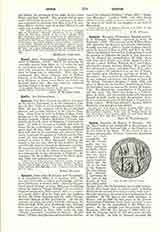

Spenser, JOHN (alias HATCLIFFE and TYRRWHIT), b. in Lincolnshire, 1601; d. at Grafton, 1671. He was converted while a student at Cambridge, and entered the Society of Jesus in 1627. After having professed moral theology at Liege, 1642, and also having served the arduous “Camp Mission”, he returned to England and partook, Whitsuntide, 1657, in a conference, much spoken of at the time, with two Anglican divines, Dr. Peter Gunning and Dr. John Pearson, afterward Bishops of Ely and Chester. All the disputants, ineluding Spencer’s Catholic colleague, Dr. John Lenthall, M.D., were Cambridge men, and may have known one another. An account of the conference was published in Paris, 1658, under the title, “Schism Unmasked”, probably by Spenser. He also wrote:” [Thirty-Six] Questions propounded to the Doctors of the Reformed Religion” (Paris, 1657); “Scripture Mistaken” (London, 1660); and other books which won him a high name as a controversialist. At the time of his death he was chaplain to the Earl of Shrewsbury.
J. H. POLLEN

